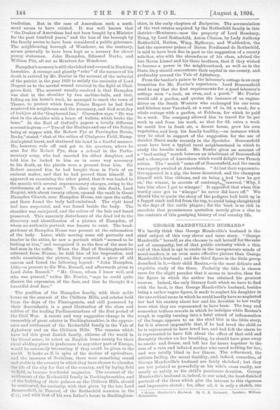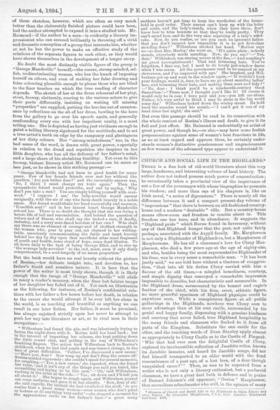GEORGE MANDEVILLE'S HUSBAND.* WE hardly think that George Mandeville's husband
is the chief subject of this very clever and terse story. "George Mandeville" herself, as she chooses to call herself for the sake not of anonymity, but of that public curiosity which a thin veil of this kind is apt to excite in the unregenerate minds of novel-readers, is an even more effective picture than George Mandeville's husband ; and the third figure in the little group described in it,—their child Rosina,—is the most delicate and exquisite study of the three. Probably the title is chosen more for the slight paradox that it seems to involve, than for the figure in which the author has attained his greatest success. Indeed, the only literary fault which we have to find with the book, is that George Mandeville's husband, besides being a rather vague figure, is made to neglect his daughter in the one critical scene in which he could hardly have so neglected her had his anxiety about her and his devotion to her really been what they are represented to have been. The long and somewhat tedious reverie in which he indulges while Rosina's cough is rapidly turning into a fatal attack of inflammation of the lungs, appears to us the chief blot in the little story, for it is almost impossible that, if he had loved the child as be is represented to have loved her, and had felt the alarm he is represented to have felt about the effect of that cold and, draughty theatre on her breathing, he should have gone away to smoke and dream, and left her for hours together to the care of a vain and inflated mother who cared nothing for her, and was totally blind to her illness. The refinement, the artistic feeling, the moral timidity, and, indeed, cowardice, of Geerge Mandeville's husband are fairly sketched ; but they are not painted as powerfully as his wife's crass vanity, nor nearly as subtly as his child's passionate devotion. George. Mandeville's husband is, indeed, to our mind, the least-finished portrait of the three which give the interest to this vigorous and impressive sketch ; for, after all, it is only a sketch, one
* GeoPoo MondaMlia'a Hagan& By C. E. Raimond. London: William. Ecinemann,
of those sketches, however, which are often so very much
better than the elaborately finished picture could have been, had the author attempted to expand it, into a studied tale. Mr.
Raimond—if the author be a man—is evidently a literary im- pressionist who can succeed brilliantly in throwing off a vivid and dramatic conception of a group that interests him, whether or not he has the power to make an effective study of the relations of the separate figures to each other, as they would have shown themselves in the development of a longer story.
No doubt the most distinctly visible figure of the group is "George Mandeville" herself,—the coarse, strong-minded, sel- fish, undiscriminating woman, who has the knack of imposing herself on others, and even of making her false drawing and false colouring plausible enough to please those who are blind to the finer touches on which the true reading of character depends. The sketch of her at the dress rehearsal of her play, stout, frowsy, slatternly, roaring to the various actors to give their parts differently, insisting on waiting till missing "properties" are supplied, putting the heroine out of counten- ance by reflections on the sit of her dress, bawling to the hero from the gallery to go over his speech again, and generally confounding every one with her impatient vanity, is a most
telling one. She is depicted as having just vividness enough to paint a telling literary signboard for the multitude, and to set
a true artist's teeth on edge by the rampancy and glaringness
of her dirty colours. Her "strong-mindedness," too, in the bad sense of the word, is drawn with great power, e specially in relation to the dread and repulsion she inspires in her little daughter, who has all the delicacy of her father's mind, and a large share of his shrinking timidity. Yet even to this frowsy, blatant literary artist Mr. Raimond can be more or less just, as he shows in this striking passage :— "George Mandeville had not been in good health for many years. Pew of her female friends ever met her without the question, 'Are you better dear P' and the invariable answer was, 'No, I think I must change my tonic again.' Then the sympathetic friend would prescribe, and end by saying, Why don't you take a rest P You are simply killing yourself with over- work." I suppose I am,' the lady-novelist would answer resignedly, with the air of one who faces death bravely in a noble cause. Her friend would shake her head mournfully and murmur, Unselfish scull' and in her inmost heart George Mandeville echoed her. There is no doubt she thought that she was living a heroic life of toil and renunciation, And behind the question of values and of fitness, who shall say she lacked a rare, if deadly, industry, and a sorry sour-faced heroism of her own ? Who shall say there was no element of courage and of stedfast strength in the woman who, year in year out, sat chained to her writing- table, ceaselessly commemorating the futile and inept, leaving behind her day by day upon that sacrificial altar some fragment of youth and health, some shred of hope, some dead illusion. To sit down daily to the task of being George Eliot, and to rise up 'the average lady-novelist' to the end, must, even if only dimly comprehended, be a soul-tragedy of no mean proportion."
But the book would have no real beauty without the picture of Rosina,—her delicate insight into, and devotion to, her father's timid and sensitive nature. It is here that the power of the writer is most truly shown, though it is likely enough that the image of "George Mandeville" will abide in many a reader's memory, when the finer but fainter image of her daughter has faded out of it. Yet such an illustration as the following, for instance, of Rosina's confidential rela- tions with her father a few hours before her death, in relation to the career she would attempt if he ever left her alone in the world, is as touching and beautiful as anything we can recall in our later fiction. Her father, it must be premised, has always enjoined strictly upon her never to attempt to push her way into literature or art, or to rival men in their occupations :— " Wilbraham had found the pin and was laboriously trying to fasten the night-dress with it. lasina held her head back ; but in the interest of imparting her scheme, she kept putting down the little round chin, and getting in the way of Wilbraham's fumbling fingers. The action took Wilbraham back to Rosina's Childhood, when he had tied scarfs and sun-bonnet strings, in the face of great difficulties. 'Father, I've discovered a new career.' Have you, dear Now wrap up and don't fling the covers off.' Roaina nodded vigorously ; she couldn't speak for several moments, for coughing.= Yes, a new career; she repeated, when she found her voice, ' and it isn't any of the things you said you hated, like scrambling and trying to be l'1k43 men '= Oh,' said Wilbraham,
tucking in th e 1
se e eider at the side.—' Yes !. sit down and I'll tell you
all about it.' She began
to cough again, and Wilbraham poured, out some medicine andshe said eagerly, nidnaeaavet it to hersilently. 'Now, first of all,' she that a great manyn wale had swallowed the stuff, , olo you or lecture or do anything 'very —even women who don t paint y '—she stopped a moment for
the appreciative smile on her father's face—' a great many mothers haven't got time to keep the wardrobes of the house- hold in good order. Their nurses can't keep up with the holes and rents, and the lady's-maids, when they have them, don't know how to trim bonnets so that they're really pretty. May can't mend lace, and do the very nice repairing of a lady's weld- robe. Now, do you realise, or are you such an ignorant father that you don't suspect how impossible it is to get first-class mending done ?' Wilbraham stroked her hand. 'Mother says so—so does Mrs. Harley,' she went on. 'It's quite plain; nobody mends, everybody needs mending. Now, do you see ? Yes, dear.' Wilbraham was staring across at the fire.—' And mending's my great accomplishment ! That and trimming hats. You've forgotten, I dare say, but I used to do lovely jail-window darns when I was seven. All the governesses used to be amazed at my cleverness, and I've improved with age.' She laughed, and Wil- braham got up and went to the window again.—' It wouldn't hurt your feelings, would it, dear, to have me go about mending ladiea' lace, and trimming their hats, and making them neat and tidy ? ' No, dear ; I think you'd be a nineteenth-century Good Samaritan.'—' There now, I thought you'd like it I Of course it would only be in ease I were poor and you—you left me alone. Father, it's very awful to think I may be alone in the big world some day.' Wilbraham looked down the wintry street. He held hard the muscles round his mouth.—' I can't get it out of my head since last night,' she said."
But even this passage should be read in its connection with the whole context of Rosina's illness and death, to give it its full and just effect. Mr. Helmond is undoubtedly an artist of great power, and though he,—or she,—may have some foolish prepossessions against some of women's best functions in life, as we at least regard and approve them, he certainly under- stands women's distinctive graciousness and ungraciousness as few women of the advanced type appear to understand it.



































 Previous page
Previous page